The Effectiveness of Infection Prevention and Control Committees in Mali
The Effectiveness of Infection Prevention and Control Committees in Mali
For decades, MSH – the lead of the USAID Medicines, Technologies,and Pharmaceutical Services (MTaPS) Program consortium – has supported governments around the world in building resilient health systems that have the sustainable capability to take coordinated, measurable actions to prevent epidemics, detect biological threats early, and respond rapidly to disease outbreaks.
In 2017, the Joint External Evaluation (JEE) for Infection Prevention and Control (IPC) gave Mali a score of 2 out of 5. Although Mali had made progress in resolving problems linked to IPC in the human health sector, there was still a lot to be done to prepare and implement a national IPC program, including establishment of IPC committees.
It was within this context that the MSH-led USAID MTaPS Program provided assistance. The project supports the Government of Mali in the fight against antimicrobial resistance (AMR) by improving IPC, optimizing the rational use of antimicrobials, and through effective, national multisectoral coordination to prevent AMR. The absence of IPC committees at health care facilities was one of the key issues identified.
This document focuses on the main factors contributing to the effectiveness of infection prevention and control committees, describing the technical approach as well as lessons learned, scalability, sustainability, and next steps.
